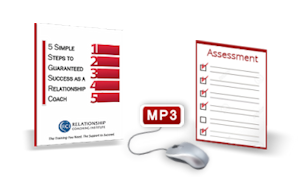 Here at Relationship Coaching Institute we provide the training, mentoring and support you need to become a successful and skilled coach, but how do you become a fantastic coach?
Here at Relationship Coaching Institute we provide the training, mentoring and support you need to become a successful and skilled coach, but how do you become a fantastic coach?
Becoming a fantastic coach, as with most skills and professions, typically follows these Four Stages of Competence:
Stage 1: Unconscious Incompetence
The trainee does not understand or know how to do something, does not necessarily recognize the deficit and may even deny that they need to learn the skill. Becoming a fantastic coach starts with recognizing your own incompetence and the value of learning and practicing coaching skills before they can move to the next stage. Those who believe they already know how to “coach” are stuck in their own ego about their skills, the value of their knowledge, expertise, “advice,” etc. tend to stay in this stage for a long time, if not permanently.
Stage 2: Conscious Incompetence
The trainee does not understand or know how to do something and they recognize their deficits as well as the value of learning new skills in addressing these deficits. Being able to accept feedback, on-going practice, and being willing to risk making mistakes is essential to the learning process in this stage.
Stage 3: Conscious Competence
The new coach understands or knows how to coach but it takes a lot of conscious effort to do so. Successfully executing their coaching skills requires intense concentration and they occasionally mess up and lapse into incompetence by repeating old habits.
Stage 4: Unconscious Competence
The coach has had so much practice and experience that coaching has become second nature and can be performed easily.
The #1 Secret to Becoming a Fantastic Coach: Your Clients Are Your Best Teacher
While learning coaching skills requires training, mastering your coaching skills requires practice and experience to move through the Four Stages of Competence.
Your client is your best teacher and if you get out of your head, put your ego aside, and are paying attention your client’s reaction to what you say and do and how you show up in your coaching session with them, you will learn all you need to know about what works, what doesn’t work and what you need to do differently.
If you pay attention and allow your clients to teach you, with practice and experience you will become a masterful coach able to dance in the moment with your clients, tune deeply into what they need from you, and be able to deliver fantastic results for them.
But if you are stuck in your ego about your judgments and beliefs about your interactions with your clients, you will not benefit from practice and experience as you will do the same thing over and over, firmly believing that you know what you’re doing and if it doesn’t work the client is not “coachable.”
A Fantastic Coach is Humble and Grateful
It takes courage to be vulnerable and reach out for support. Your client will experience fear, self doubt, and resistance to being vulnerable with you.
A good coach is highly aware of how hard it is to be vulnerable and is humbled and grateful to be allowed to support their client and accepts 100% responsibility for meeting the client’s needs effectively as measured by the client’s reactions in session and results out of session.
Ego and judgment interfere with being humble and grateful and focuses more responsibility on the client to get results and benefit from coaching than on the coach to be masterful in their approach to the client.
A Fantastic Coach is Intuitive and Organic
Being “in your head” is antithetical to effective coaching. You can’t dance in the moment with your client and respond effectively from being your head focusing on your judgments, feelings, beliefs, analysis, options, strategies, etc.
As illustrated in the above Four Stages of Competence, all new coaches start out “in their head.” When you are first learning a skill it seems complicated and overwhelming and you might question your ability to master it. Over time, with practice and experience you become more comfortable and build your self confidence.
With continued practice and experience a masterful coach learns how to trust their skills and intuition and their coaching flows intuitively, organically and effortlessly. When you reach the stage of Unconscious Competence in your professional development coaching becomes an addictive high, easy and fun and gratifying and fulfilling while being challenging enough to keep you on your toes as each client presents their unique mix of fears and desires, strengths and weaknesses, successes and failures.

